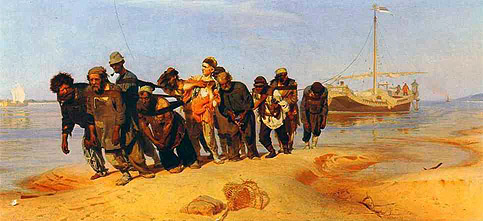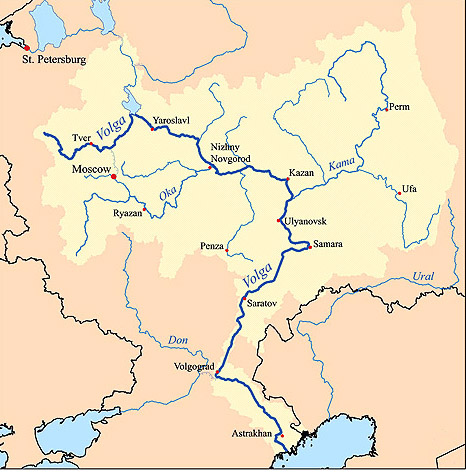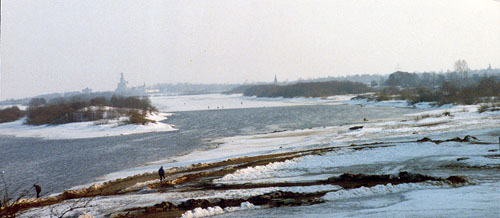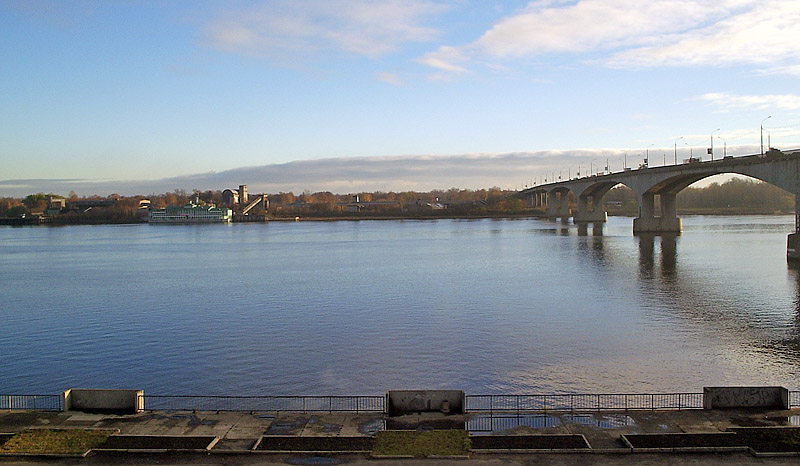
Ilia Repin, Бурлаки на Волге (1870-1873) aka Barge Haulers on the Volga;
in the Russian Museum, St. Petersburg
I saw this famous Repin painting when I was in St. Petersburg years ago. It is one of the images that comes to my mind when I think of the Volga River. The other thing that comes to mind is not an image, but a song, The Volga Boatmen Song, which you have probably heard at one time or another.

Located on the southern stretch of the Volga River, Volgograd (Волгоград) aka Tsaritsyn (Царицын) from 1598 to 1925 aka Stalingrad (Сталинград) from from 1925 to 1961 was the site of one of the most decisive battles of World War II. The Battle of Stalingrad, fought from 21 August 1942, when the German Army first reached the city, until 2 February 1943, when the German Army surrendered to the Russians, was one of the most bitter, bloodiest battles ever fought with at least two million total casualties--probably a lot more. The Russian victory over Hitler's armies was the turning point of the war in Europe.
Hitler had hoped to capture the city for a number of reasons:
- it was an important industrial center
- it was a major transport center on the Volga River
- capture of the city would support the German army attack south towards the Caucasus and the oil fields there
- the city was named after Stalin--it was for that reason that Stalin ordered no retreat from the city and that anyone who could fight should be sent there to defend the city.
Bitter fighting for the city raged for months in houses, factories, grain elevators; everything that could be was turned into a mini-fortress. As a result, the city was reduced to just about rubble everywhere. One of the keys to the Russian victory was that the Germans never made a sustained attempt to cross the Volga. The safety of the river barrier allowed the Red Army to build up a large number of artillery batteries on the eastern bank and to shuttle supplies and reserves across the river and into the city, which was on the western bank of the river. On 19 November, the Red Army unleashed an offensive attack that surrounded the Germans in a large pocket at Stalingrad. Almost three months later, the remnants of the German army surrendered.
There is a lot of material available about the Battle of Stalingrad on the web (in English, German and Russian). The best book is William Craig's, Enemy at the Gates (1973).
A memorial complex commemorating the battle, dominated by a huge sculpture of Mother Russia, is located on Mamaiev Kurgan, a hill that saw some of the most intense fighting during the battle. In 1961, as part of Khrushchev's de-Stalinization campaign, the city's name was changed to Volgograd.



The Volga at Tver (Kalinin)
The Volga (Волга) River is the longest river in Europe, almost 2,300 miles, and pretty much considered the national river of Russia, "Mother Volga." Originating in the Valdai Hills northwest of Moscow, it flows slowly eastward through Iaroslavl, Nizhni Novgorod and Kazan, then southward through Samara, Saratov and Volgograd until it reaches the Caspian Sea in a wide delta at the city of Astrakhan. There are numerous hydroelectric dams on the river with some of the world's largest reservoirs.

